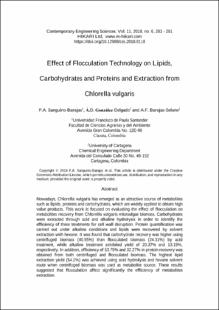Effect of Flocculation Technology on Lipids, Carbohydrates and Proteins and Extraction from Chlorella vulgaris
Artículo de revista
2018-03-03
Contemporary Engineering Sciences
Bulgaria
Nowadays, Chlorella vulgaris has emerged as an attractive source of metabolites
such as lipids, proteins and carbohydrates, which are widely applied to obtain high
value products. This work is focused on evaluating the effect of flocculation on
metabolites recovery from Chlorella vulgaris microalgae biomass. Carbohydrates
were extracted through acid and alkaline hydrolysis in order to identify the
efficiency of these treatments for cell wall disruption. Protein quantification was
carried out under alkaline conditions and lipids were recovered by solvent
extraction with hexane. It was found that carbohydrate recovery was higher using
centrifuged biomass (40.55%) than flocculated biomass (24.31%) by acid
treatment, while alkaline treatment exhibited yield of 20.37% and 13.19%,
respectively. In addition, efficiency of 53.75% and 32.27% in protein recovery was
obtained from both centrifuged and flocculated biomass. The highest lipid
extraction yield (54.2%) was achieved using acid hydrolysis and hexane solvent
route when centrifuged biomass was used as metabolite source. These results
suggested that flocculation affect significantly the efficiency of metabolites
extraction.
- Ambiente y Vida - GIAV [124]
Descripción:
Effect of Flocculation Technology on Lipids, Carbohydrates and Proteins and Extraction from Chlorella vulgaris.pdf
Título: Effect of Flocculation Technology on Lipids, Carbohydrates and Proteins and Extraction from Chlorella vulgaris.pdf
Tamaño: 536.7Kb
 PDF
PDF
 LEER EN FLIP
LEER EN FLIP
Título: Effect of Flocculation Technology on Lipids, Carbohydrates and Proteins and Extraction from Chlorella vulgaris.pdf
Tamaño: 536.7Kb
 PDF
PDF
 LEER EN FLIP
LEER EN FLIP
















